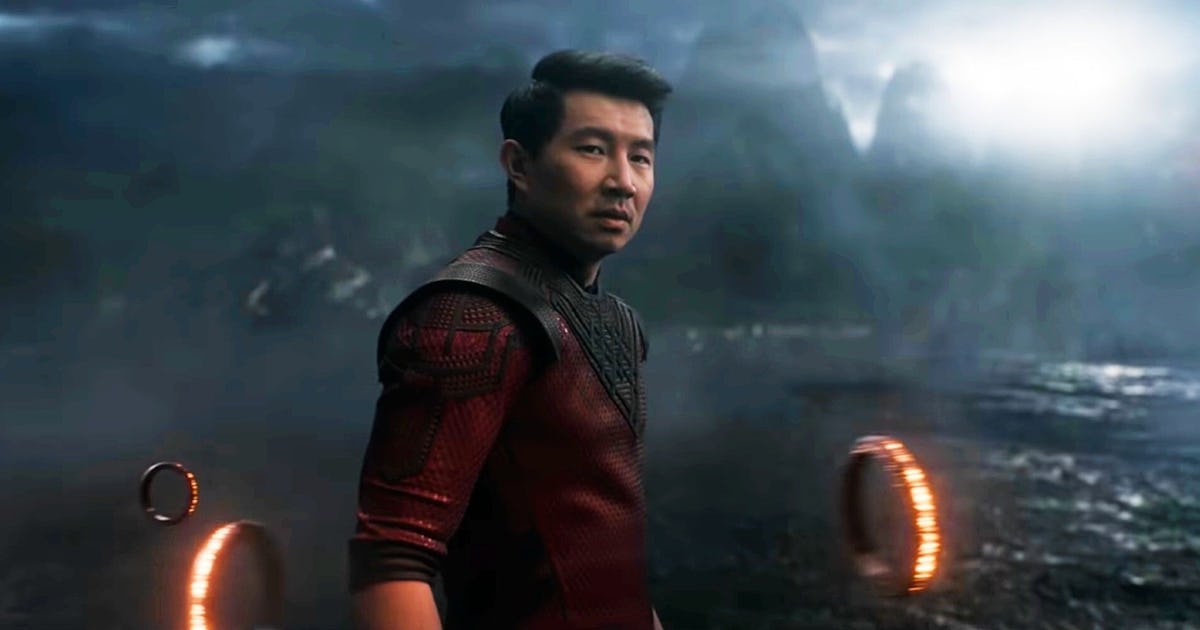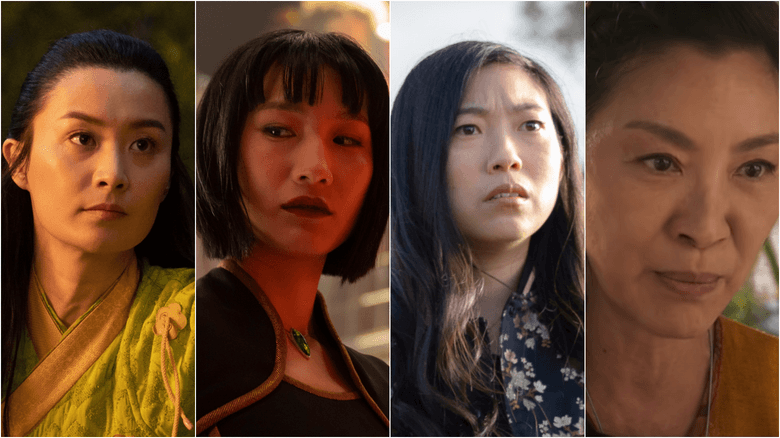
By Zachary Cui
This 2021 Marvel blockbuster featuring a majority Asian cast tells a story from Shang-Chi’s perspective as we uncover his past, confront his family issues and resolve conflicts. This film has a rotten tomato score of 91%, along with other fairly high ratings from the general public. I enjoyed parts of the movie as it had its creditable moments such as the well-choreographed martial art fight scenes. Specifically the bus scene, which was fun to watch. The relationship between Shang-Chi and his sister was interesting and most of the music and production quality was good.
But from a directorial standpoint, Shang-Chi has an unexpected amount of core problems. As I was sitting down and watching this 2-hour film, I couldn’t help but notice the flaws and errors throughout the film that made me incrementally bored. The exposition during Act 2 of the movie contains the epitome of my initial struggles with the film. The content presented itself so unnaturally that it felt more like a documentary rather than an action movie. According to The Closer Look, the ability to dilute exposition within your story is one of the most difficult things to get right as a writer. If done wrongly, the audience can immediately notice and form criticism about the film. Shang-Chi’s unexciting exposition gave an unwavering sensation that this movie is just another mediocre CGI blockbuster. In a period of heavy inclusivity, where even colossal companies need to break free of the stereotypical tropes to be acknowledged by the public eye, Shang-Chi presents itself as a misguided film that doesn’t fully represent Asian culture nor fulfills the expectations of a Marvel movie.
The Confusion with The Tropes
My main issue does not lie with the representation of Chinese culture or the mixing of race amongst the cast, but rather the horrendous balance of genre within this film. The movie’s general tone indicates a serious, dark, and modern spy theme. However, the film also tries to communicate a traditional martial arts trope stuffed with vibrant colours and moods. Furthermore, it’s a fantasy story packed with dragons, monsters, and a living bamboo forest. As you can see, the movie gets lost within different genres that contrast each other; making becomes difficult for the audience to connect to the film.
The producers of Shang-Chi (2021) should have deviated from the majestic trope of Chinese culture and stuck with a more modern and technological approach. It would coherently fit better with the first half of the film. They should have shifted from the comic origin and researched the traditional Chinese culture to add further representation through the usage of weapons, architecture, and technology, rather than keeping it surface level. The film takes most of its inspiration from the comics and builds off the original ideas. Is the comic better than the film? That’s debatable. But both have their values and limitations.
As the movie progressed, the ideas captured within the film barely differ from the pattern of previous Marvel directors. For example, the secret organization concept has been reused within the Marvel Cinematic Universe (MCU) so many times that it becomes unappealing to watch. Some examples would be: Hydra, Red Room, etc. A better idea would have been to replace it with a cult, as its core values are much stronger than an organization. A secret yet powerful cult that acts under the influence of money and power, working towards a common goal to find the Other Dimension. Thus, providing a passion that drives them to fight back, rather than just following orders.
The Inadequate Storyline with Plot Holes
As mentioned before, the generic tropes of the movie with its poor character portrayals derive the audience of the feelings of danger and thrill, which are arguably the most critical factors in an action movie. The climax depended solely on two CGI monsters that we have absolutely no connection to as they fight alongside the heroes. A fight can only be truly interesting if emotions are tied to the characters and there are high stakes. It isn’t hard to choreograph a well-done fight scene, but many directors seem to struggle to make these scenes hold value and allow the audience to connect with the characters. The best way to make a fight uninteresting is by introducing CGI monsters during the last 20 minutes with no prior emotional foreshadowing, which is precisely what the Shang-Chi directors did. What’s even worse is that they didn’t bother giving the monsters any connections to the protagonist or antagonists. The lack of emotion made the final fight scene unenjoyable to watch. But I do have to give credit to the martial art fights such as the bus fight and outside the building fight as they were well-choreographed and held good stakes and emotional value.
During the transition from Act 2 to 3, there was one instance that shows utter ignorance from the directors. It involved Ben Kingsley and his MacGuffin device. A MacGuffin is a device with the sole purpose of pushing a plot forwards. In this case, after the main characters get captured, Ben Kingsley’s character shows up and brings out the unknown creature from the Other Dimension. This creation was the only reason why the main characters were able to escape from captivity and reach the Other Dimension. But how did Ben Kingsley’s character end up there? How did he get the MacGuffin creature? Why is he the only one who can communicate with it? Everything is just up to coincidence. It doesn’t help that the audience turns a blind eye to this unacceptable lazy writing.
Furthermore, the lack of stakes and character storylines makes the film tedious. The antagonist also reflects the laziness of the directors. Despite trying to create an emotional and logical origin story for the antagonist, The Mandarin (Shang-Chi’s father), they don’t quite show the development process. This makes his emotional changes in the final act seem unprecedented. His backstory originates from him being an evil tyrant who turned good after becoming a father, only to return to being an antagonist after his wife’s death. Although this is a decent concept, the film barely skims over it. There is no scene of Shang-Chi’s father being nice to him. Thus, the final scene lacks any reason for Shang-Chi to feel empathetic towards him as the film did not show any significant moment that defined their relationship between them before his father became evil. We couldn’t experience the important connection between the two which makes the final fight scene less emotional.
Pushing Feminism and Comedic Failure

The characters are also very flawed in the sense that they are all following such strict regulations due to the societal call for representation. This is seen through the women roles within the movie. Just a disclaimer: I have no problems against feminism or powerful women, but at a certain point, it ruins the plot as it’s trying too hard to appeal to the social standards. For example, the main character’s sister is a badass self trained martial artist that fights better than a professionally trained Shang-Chi and has no problem facing off any threats. In like manner, Shang-Chi’s aunt, who can almost do anything the movie asks her to do without needing help from men and fighting everything herself. It would have been easier if his aunt was the one to obtain the rings from his father. These characters are quite prevalent, but with such tropes, it gives a sense of false portrayal as the movie is trying to please the feminist audience by saying “Look the women in our movie are powerful.”
There is nothing initially wrong with that, however, when these characters make up the majority of the supporting cast, it becomes a struggle for the audience to feel a sense of tension or emotion as they already know that these characters will be protected by plot armour. This feminist outlook is further supported by Awkwafina’s role, Katy. She is so utterly useless to the plot, only serving to be the basic semi-funny character that drops one-liners occasionally. That alone is tolerable, but why did the directors give her the grand role as an archer in the final sequence? It was unnecessary as she was never mentioned to be good at archery and even if she was placed on the front line, there would be no difference as we know that nothing is going to happen to her. This problem is proven throughout the MCU as they tend to use characters specifically for comedic relief and one liners. This degrades the importance of said characters, giving them no layers, depth or goals. Also the forced and unnecessary jokes can change the entire tone of a scene.
Comparison to Black Panther
This Marvel movie pales in comparison to one of their biggest box office hits, Black Panther. The extraordinary film was built on the emotions and stakes of all the important characters. Even the antagonist, Killmonger, had such a deep and thorough backstory that could be sympathized with. This shows how connections and risks can make a movie so heart-wrenching yet so exciting. Every aspect where Shang-Chi falls short is a strength within Black Panther. Not only does the film create a sense of inclusivity with its cast members and overall message, it also incorporates great character origins, successful comedy, and raises the stakes to develop compelling and exciting action sequences. Black Panther is a prime representation of its respected culture and good writing, it is the embodiment of everything that Shang-Chi couldn’t be.
To Conclude…
My evaluation of Shang-Chi lies between the boundaries of poor directing and a lack of elements that are essential to film-making. I call this movie imperfect because, in the end, it still has its own merits and entertainment value to it. Shang-Chi is wasted potential of what could be another Black Panther, but with its plague of problems, it’s hard to entertain people as the expectations rise to monumental proportions each year.